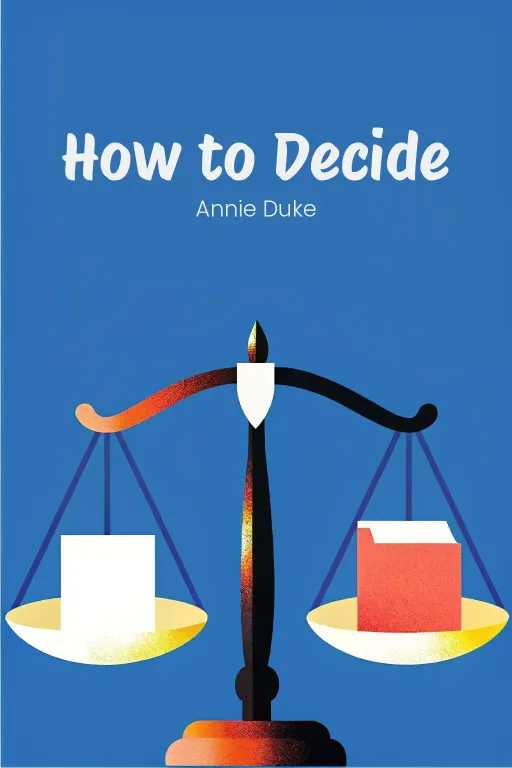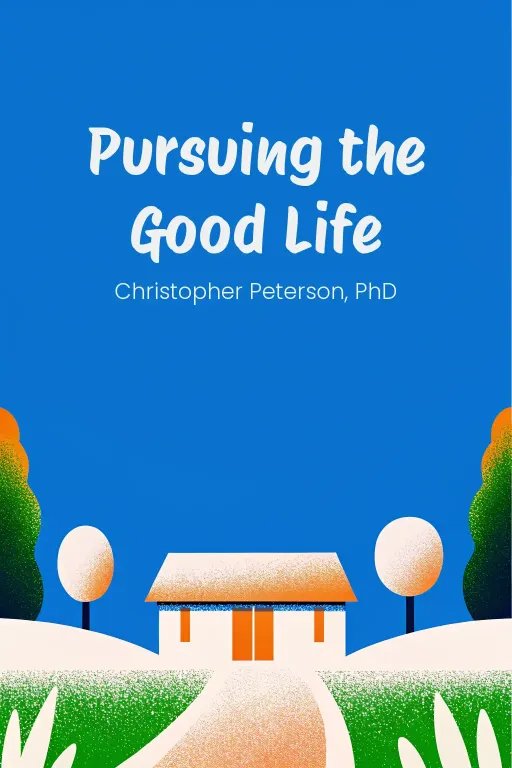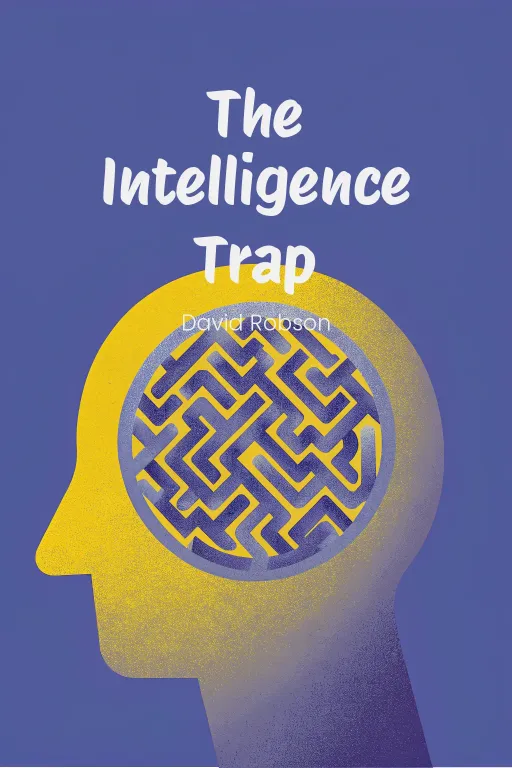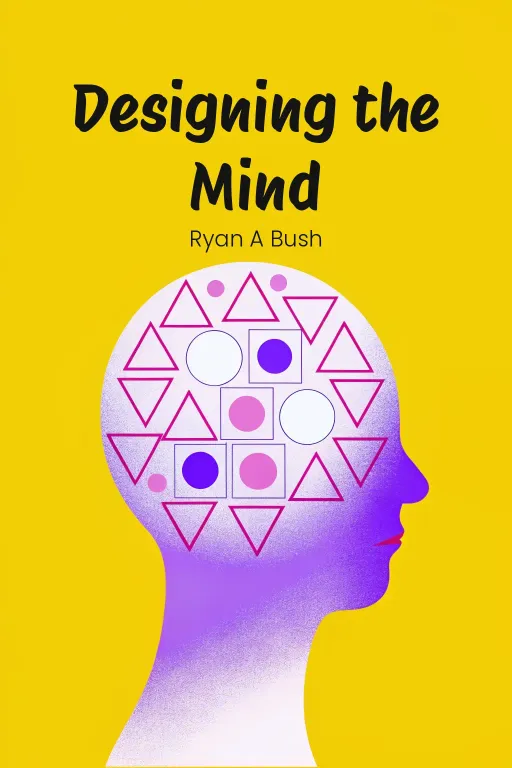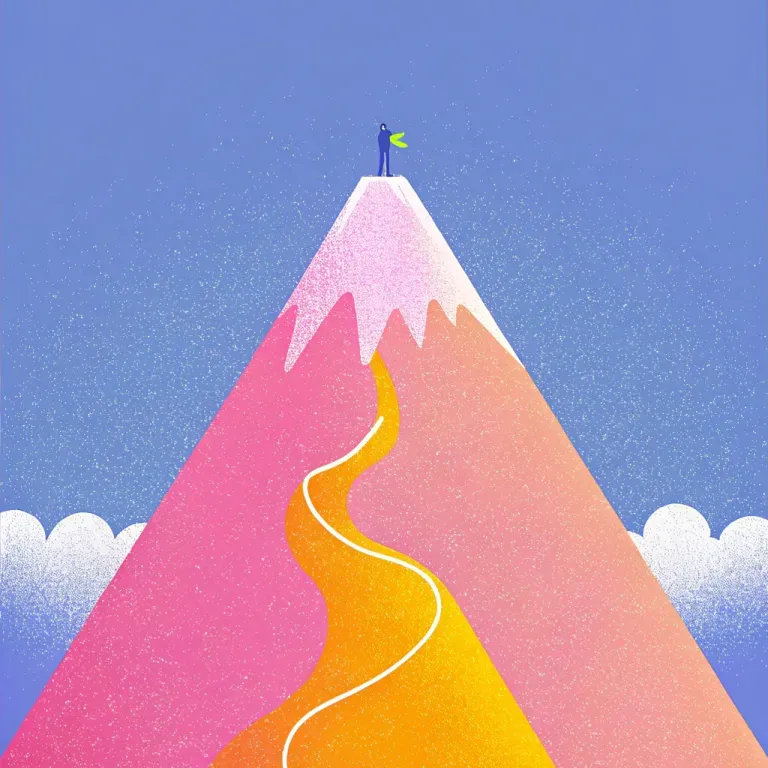
Climb Yourself: Turn Sabotage to Strength
Podcast by The Mindful Minute with Autumn and Rachel
Transforming Self-Sabotage Into Self-Mastery
Climb Yourself: Turn Sabotage to Strength
Part 1
Autumn: Hey everyone, and welcome back! Today, we're tackling something we all face: climbing that incredibly tough mountain... ourselves. Ever wonder why you sometimes get in your own way, even when you “really” want something? If that sounds familiar, you're in the right place. Rachel: Ah, so we’re talking about that inner voice that tells you to binge-watch TV instead of finishing that project, or the one that whispers doubts right before a big presentation? The kind of internal obstacle course we all seem to be running. Autumn: Precisely, Rachel! We’re diving into Brianna Wiest’s book, “The Mountain Is You”. It's a “really” insightful exploration of why we self-sabotage. I mean, it basically reframes these behaviors as almost like a subconscious way we try to keep ourselves safe. The book “really” digs into emotional intelligence and self-awareness, and offers practical tips to turn those barriers into steps forward. Rachel: Okay, self-sabotage, upping our emotional game, and embracing the discomfort, huh? Sounds…intense. So, what’s our plan of attack today? How exactly are we going to conquer this metaphorical mountain? Autumn: Good question! We'll break it down into three main parts. First, we're going to uncover the hidden reasons behind self-sabotage. Why do we do things that hurt us, and where does that come from? Then, we'll get into some practical tools to boost our emotional intelligence – things like mindfulness and journaling. They seem small, but they can “really” create lasting change. And finally, we'll talk about how all of this builds into a lifelong practice of self-mastery, which doesn't just change you. It benefits everyone around you, too! Rachel: Alright, so understanding the 'why' behind our self-defeating habits, getting practical with some actionable strategies, and then seeing the ripple effect of personal growth. Makes sense. I mean, who doesn’t love a good mountain metaphor, right? Let’s just hope this climb doesn’t involve actual hiking boots, because those are not my thing.
Understanding Self-Sabotage
Part 2
Autumn: Okay, so picking up where we left off, let's “really” dive into understanding self-sabotage. This truly is foundational, because, honestly, without understanding why we do what we do, trying to change feels like putting a tiny band-aid on a huge, gaping wound, you know? Rachel: Right, because it's easy to say, "Stop procrastinating," or "Stop overthinking," but if you don't even know where that comes from, aren't you just going to keep running into the same brick wall over and over? Autumn: Exactly! Self-sabotage is often deeply tied to subconscious fears, internal conflicts. It's more than just bad habits or laziness, it’s often about emotional needs or beliefs we’ve picked up over time—sometimes totally unconsciously. Like, someone might have heard things growing up like, "Money changes people," or "Rich people are greedy.” And then, as an adult, they might unknowingly avoid success because they link it to something negative. Rachel: So, it’s not like they are thinking "I don't want to be successful." It's their brain kind of sneaking in these old stories without asking permission, and then they make decisions. Autumn: Exactly! Those narratives are often formed in childhood. Remember Carl Jung’s example from the text? He was kept out of school by an accident, and he linked that with escaping or feeling safe. Even later, that subconscious connection still affected him. It's not rational, it's a protective thing built on past stuff. Rachel: Wow, so a simple childhood injury shaped his behavior for years. That makes you wonder, how often are we stuck in those kinds of loops without even realizing it? Autumn: Honestly, way more than we'd like to think! And they show up in sneaky ways. Take procrastination. Super common, right? Most people think it's laziness. But really, it’s often avoiding something deeper, like the fear of failing, the fear of not being good enough. Rachel: Okay, I feel attacked! Let’s break this down. Let’s say I have a big presentation. Instead of working on it, I spend hours cleaning, or scrolling, or I don't know, organizing my sock drawer. What's my brain doing there? Autumn: Great example! Your brain is probably trying to protect you from the fear of messing up, of being judged. By putting it off, you're creating a buffer—like a safety net. As long as you haven't started, you can't fail, right? Temporary relief from anxiety, but then it creates even more stress later. Rachel: Like kicking the can down the road, and then realizing it’s a boulder aimed straight at your head. It feels good now but crashes back later. Autumn: Exactly. And, perfectionism works the same way. People think it’s striving for excellence, but really, it’s fear—fear of mistakes, judgment, even success, because that means more pressure. Instead of starting or finishing, you get stuck tweaking and second-guessing. Rachel: Yeah, I've seen that. Someone spends forever "perfecting" something, then misses the deadline or just gives up completely because it’s never good enough. Like being stuck on a hamster wheel. Autumn: Exactly, and it's exhausting. Perfectionism isn't about the work; it's about how the work reflects on us. And, overworking is self-sabotage disguised as dedication, right? It comes from the fear of not being "enough", so people try to prove their worth through productivity. Rachel: Okay, but overworking sounds like a "good" problem. Don’t people get rewarded for that? Like, the all-nighter programmer gets praised, maybe promoted, right? Autumn: On the surface, yes, but it's not sustainable. That programmer could burn out, start making mistakes, lose passion entirely. Overworking is often avoiding feelings of inadequacy; a shield, but the longer it goes on, the more damage it causes—to health, relationships, and careers. Rachel: I get it. Procrastination, perfectionism, overworking – they’re all defenses. But, am I understanding correctly? They are learned? They Often trace back to how we were raised? Autumn: Absolutely. Many of these patterns are rooted in past experiences, especially childhood. If you grew up where vulnerability wasn’t encouraged, or achievements were the only source of validation, it makes sense you’d carry that into adulthood. Like if showing emotion was seen as weakness, you might suppress feelings, which could mean avoiding relationships or taking risks.. Rachel: So, stepping back for a second—it sounds like the key to breaking these patterns is figuring out what's fueling them in the background. But how do you even start with something subconscious? Isn't that the whole point of it being subconscious? Autumn: That’s where tools like introspection, journaling, and emotional validation come in. You start by asking questions that peel back the layers: "What am I really afraid of?" or "What belief is this protecting me from?” Journaling's great for spotting patterns—like realizing you procrastinate more when the stakes are high, or you overwork when you feel unsure about your skills. Rachel: So, like being a detective—looking for clues, connecting the dots. Where did these habits Come from. Autumn: Exactly! And along with introspection, emotional validation is huge. Instead of dismissing our fears, we acknowledge them. Like the writer from the text, admit they're scared of a flawed novel. Naming that fear without judgment is the first step. Rachel: Sounds simple, but easier said than done, right? Fear can be sneaky. Autumn: It is, but that is why taking small steps—microshifts—can make a difference. Gradually expanding your comfort zone, so the fear doesn’t overwhelm you. If public speaking terrifies you, you don't jump right to a conference of 5,000 people. You start with a few friends or a small group. Rachel: Build the muscle before the heavy lifting. Okay, what if I take those small steps and still fail? How do I not spiral into self-criticism or just give up? Autumn: Great question! That’s where reframing is essential. Failure isn’t the end—it’s feedback. Every stumble is just data, helping you see what works, what doesn’t, and where to improve. Athletes do this all the time—they review their mistakes to get better. The same applies to life, right?
Emotional Awareness and Processing
Part 3
Autumn: Alright, Rachel, so we've dissected self-sabotage. Now, let's move on to something that can “really” help us break free from those patterns: developing emotional awareness. It sounds intense, I know, but it's the key to understanding the “why” behind our actions. Rachel: “Intense” is one word for it! Sounds like a deep dive. But okay, I'm game. So, emotional awareness... is this more than just saying, "I'm sad" or "I'm mad"? Autumn: Oh, definitely. It's about understanding why you feel a certain way. Like, what's the root cause of that emotion? And then, learning healthier ways to process it. When you're emotionally aware, you can respond thoughtfully instead of just reacting automatically. Rachel: So, it's kind of like detective work for your subconscious? Tracing the emotion back to its origins. Autumn: Exactly! And one thing that's often missed is emotional validation. We live in a society that tells us to toughen up or just get over things. But the truth is, all our emotions matter, even the tough ones. Emotional validation is about creating space to say, "It's okay to feel this way." Rachel: Yeah, I see that. People are always trying to rush the process, aren't they? Grief is a good example. No one wants to sit with someone who’s grieving. It’s uncomfortable. Autumn: Right? But when you dismiss those emotions, you're basically trapping them. Unprocessed grief, sadness... it doesn't just vanish. It festers and can resurface later in unexpected ways. Validating your emotions allows you to process them, move through them, and eventually find closure. Rachel: Okay, closure is great. But how do you make sure you're not just wallowing in it? Where's the line between healthy reflection and, you know, going down a rabbit hole of self-pity? Autumn: Good question, Rachel! It's about understanding the difference between emotional suppression and emotional control. Suppression is just denying your feelings, stuffing them down and hoping they disappear. Control is acknowledging the feeling, understanding it, and then choosing how to respond. Rachel: Okay, that makes sense. So, it's not about ignoring the anger, or exploding. It's about finding a middle ground. But easier said than done, right? I mean, my first instinct when I'm angry is to react. Are there actual techniques to stop that knee-jerk reaction? Autumn: Absolutely! Mindfulness is a game-changer. It helps you pause before reacting. It's a moment of awareness allowing you to ask “Wait, what is this emotion trying to tell me?". If you're feeling anxious, for example, mindful breathing can help calm your nervous system enough to think straight . Rachel: Mindful breathing... Okay, I can picture that. Deep breaths, yoga poses, the whole thing. But how does that work in a real situation? Like, if you're facing a fear, like public speaking? Autumn: Ok. You're about to go on stage. Your heart's racing, you're sweating, right? Mindful breathing can be as simple as inhaling deeply for four counts, holding for four, and exhaling for four. It's called four-square breathing. Rachel: Four-square breathing... I think I can handle that. Autumn: Exactly! It grounds you. It physiologically calms your nervous system, and emotionally it reminds you, "I have the tools to handle this." Rachel: So, you're tricking your body into thinking it's not in danger? I get it. Okay, mindfulness is one tool. What about journaling? I've tried it, but it always turns into a complaints list. Autumn: Journaling is way more than just venting. It's about self-discovery. Writing things down helps you externalize your thoughts and gives you clarity. If you're procrastinating, for instance, you might write, "Why am I avoiding this?" And you might realize you're afraid of failure, which goes back to something that happened in your past. Rachel: So, journaling is like holding up a mirror to your mind? It helps you untangle things and see them more clearly. Autumn: Exactly! And it also helps you spot patterns. You might notice your stress levels spike whenever you're short on sleep or dealing with criticism. That's valuable information for understanding your triggers. Rachel: Speaking of triggers. It sounds like we are just walking collections of unresolved issues! So, emotional awareness is also about figuring out what sets off our biggest reactions? Autumn: Yes, triggers are key. Seeing our triggers as alarm bells that signal unresolved issues from your past is very important. When a friend cancels on you last minute, and you have a huge reaction, it might tie back to feeling abandoned or unimportant in the past. Recognizing those connections lets you respond thoughtfully, instead of just getting angry. Rachel: So, a trigger isn't just something that annoys you. It's an opportunity to understand why it affects you so deeply? Autumn: Absolutely, Rachel. Emotional triggers are windows into deeper personal growth. The more you explore them, the more resilient you become. You're no longer controlled by those reactions. Emotional awareness doesn't eliminate challenges. But it gives you the strength and clarity to face them.
Transforming Self-Sabotage into Self-Mastery
Part 4
Autumn: So, emotional clarity helps us identify what needs changing, right? From there, we can turn those insights into real action, into strategies for growing as people. That's really where self-mastery steps in. It’s much more than just dealing with self-sabotage, or just managing emotions by themselves. It’s about taking all that understanding you've gained and then actively remaking how you live, how you connect with people, and how you develop. Rachel: Okay, so where are we going with this practically? Are we moving past just figuring out the issues to actively mastering ourselves? Taking all that internal mess and actually building something useful from it? Autumn: Totally. It's learning to match your actions with who you truly are and what you truly believe in. Think of it like fitting the pieces of a puzzle together, creating a life that “really” shows who you are inside, at your core. The great thing about self-mastery is that it doesn't just change you; actually, it has a ripple effect, influencing your communities, your relationships, and even, like, broader trends in society. Rachel: Right, I’m following. But let’s get real for a second, Autumn. What does it actually look like to live authentically? Is there, like, a guide we should all be following? Autumn: Look, it “really” kicks off with figuring out what "being real" means to you. And a huge part of that is untangling yourself from what society expects from you. You know, those outside ways we measure success that often keep us stuck and feeling unsatisfied. Okay, so let me use an example from the text, Sofia, the executive. She spent all her time killing herself to get to the top, looking for that approval – you know, financial security, people looking up to her. But no matter how many promotions she got, it never “really” filled her up. Why? Because what she did for a living didn't match her real desire to make a difference in her community. It wasn't until she made the difficult decision to leave her job and start her nonprofit that she discovered what she was looking for. Rachel: That's a bold move. Walking away from a six-figure salary and job security and stability? I can practically hear the audience collectively gasping and thinking, "I could never do that." But I guess you're not saying we should all quit our jobs, right? Instead, the takeaway is to “really” question if the life you're building actually lines up with what you truly value. Autumn: Exactly. Sofia’s story is extreme, but honestly, the idea applies to everyone. Are you making choices based on what “really” motivates you, or are you living by someone else's rules? See, once people start making choices that reflect who they “really” are, something “really” special happens: they start rethinking what success even looks like. Rachel: Okay, okay, let’s dig into that. Redefining success – are we like, overturning this whole idea that we need money, status, and power that we've all been taught to chase? Autumn: In a way, yeah. Think about how obsessed we are with being productive. How many people work themselves to death trying to prove their value by how much they get done? We've turned burnout into something to be proud of. But it’s “really” not sustainable. Self-mastery changes that story, “really” replacing those outside rewards with more internal things, like feeling fulfilled, experiencing peace, and having real connections with people. Rachel: So, instead of worrying about your paycheck or how many hours you worked, you start asking, "Did I set some boundaries today?" or "Did I do something today that actually matters to me?" That's a tough change, though. It feels risky. We're so used to thinking that what society says is important is the only thing that matters. Autumn: That's where you need to reframe things and make small shifts. You start small, replacing that need to constantly achieve with moments of real joy. Wiest talks about this in the text “really” well, how feeling fulfilled long-term often comes down to the little things. You know, making time for real talks, pursuing hobbies, or even just pausing to recognize how far you've come. Those choices create habits, and habits shape your life. Rachel: Okay, but let me throw a wrench in the works here. What about when things get uncomfortable? Change probably isn't all sipping tea and relaxing. There's going to be struggle, fear, and risk when you're trying to live authentically. How do you deal with that without backing down? Autumn: Yeah, you're spot on. Being uncomfortable is part of the process, hands down, but it’s also what helps you grow. When we push ourselves into situations where we don't feel at ease, we're proving to ourselves that we're capable of more. Take Lane, for instance, the graphic designer in the text. They kept putting things off because they were afraid of failing and being rejected. But instead of giving in to that fear, they leaned into it. They shared their work, asked for feedback, and slowly, they started building more than just a portfolio. They also became more confident in themselves. It's showing up, even when you're scared, that “really” opens the door for change. Rachel: So, Lane didn’t just avoid the discomfort—they used it as a tool. But I'm guessing there were some mistakes along the way, right? Autumn: Oh, for sure. And that's the thing—you've got to accept that growth isn't a straight line. Mistakes, rejections, even total failures, are all part of it. Think about climbing a mountain. You don't just walk straight to the top. The path is rocky, you might slip, but every step, even the stumbles, gets you higher. And eventually, being uncomfortable becomes less of a roadblock and more of a lesson. Rachel: Okay, that's a good way to put it. But beyond just, you know, “embracing the suck,” what about this idea of letting go? We hear it all the time – “let it go,” “detach from the outcome,” but actually, how does that even work when you're trying to master yourself? Autumn: Yes, you're describing non-attachment, which is about releasing the need to control how things turn out or cling to specific results. Non-attachment doesn’t mean detaching or giving up, it's about focusing on what you do and why you do it, while letting go of the worry about how those actions will be seen or what they’ll lead to. For example, let’s say someone handles conflict by bottling up their feelings, as described in the text. They suppress their emotions, thinking that’s the “controlled” response, but suppression only creates stress and eventually causes them to explode. Rachel: I got it, so holding it in seems like control, but “really” isn't. So what do you do instead? Autumn: Process your emotions along with being mindful. Instead of suppressing how frustrated you are, you could try, like, a mindful approach. Acknowledge how you're feeling in the moment, think about where that feeling is coming from, and then respond thoughtfully. This way, you can respect your feelings without letting them take over. It's not about control in the traditional sense; it's about finding balance and staying present. Rachel: Okay, I’m starting to see how non-attachment helps create that balance. But what’s “really” interesting is how it doesn’t just change you as an individual—it seems to spread outward. The text mentions a ripple effect of self-mastery. How does that play out? Autumn: That’s the “really” cool thing about growing internally—it doesn’t stop with just one person. When someone becomes more aware of their emotions, more grounded, and more in touch with what they believe in, it changes how they act in the world. For example, a principal who goes from just reacting to situations to making decisions with emotional awareness can totally change the feeling of an entire school. They create an environment of trust, understanding, and strength. And, you know, on a smaller scale, even if someone just improves their own emotional awareness, they might inspire their friends or family to want to grow and understand themselves too. Rachel: So it sounds like self-mastery is the ultimate pay-it-forward idea—you do the work on yourself, and suddenly your personal life and your community start to benefit. That’s a pretty powerful ripple effect. Autumn: It “really” is. That’s why self-mastery has so much more to offer than just self-help. It’s about choosing to live in a way that’s real and intentional, and when more people do that, it “really” contributes to everyone’s well-being. Rachel: Alright, I think I’m ready to give this whole thing a shot, but let me guess … no easy way out, right? Autumn: Nope, no easy way out, Rachel. Just, you know, take intentional steps, be willing to deal with being uncomfortable and growing, and “really” dedicate yourself to staying true to who you are. Self-mastery isn’t a destination, it's a way of becoming.
Conclusion
Part 5
Autumn: Okay, so that pretty much wraps it up. Today, we dove deep into self-sabotage. And we looked at it, not as some personal defect, but really as a complex way we try and cope with our fears, the way we've been conditioned, and those unmet emotional needs we all have. Understanding where it comes from, that's really the key to shifting from self-sabotage to self-mastery. We talked about tools like mindfulness, journaling, and small, doable steps to rethink our behaviors. Rachel: Right, and we also touched on emotional awareness because it's not just about naming what you're feeling, right? It's about learning to actually process those feelings with curiosity instead of instantly judging yourself. And we can't forget those lessons on non-attachment and really embracing discomfort – ideas that can totally change how we see success, failure, and personal growth, don't you think? Autumn: Totally. Getting to self-mastery, it's all about intentional living. It's about lining up your choices with who you truly are, letting go of needing everyone else's approval, and moving into a space where personal growth is a gift. And not only for yourself, but for the people around you too. Rachel: So, here's the big thing I hope everyone listening takes away: that mountain you're climbing isn't there to block you; it's there to teach you. Every single challenge, fear, and even those missteps, they all are part of the journey and shape who you will become. So, ask yourself, what's one intentional step you can take today? Autumn: Exactly! Growth can feel hard, even messy, but it's always changing you. So whether it's trying a bit of mindfulness, rethinking a fear, or just taking a moment to think, remember every step counts. Rachel: Alright everyone, until next time, keep climbing. You might be the mountain, but you're also the one who gets to reach the top.





